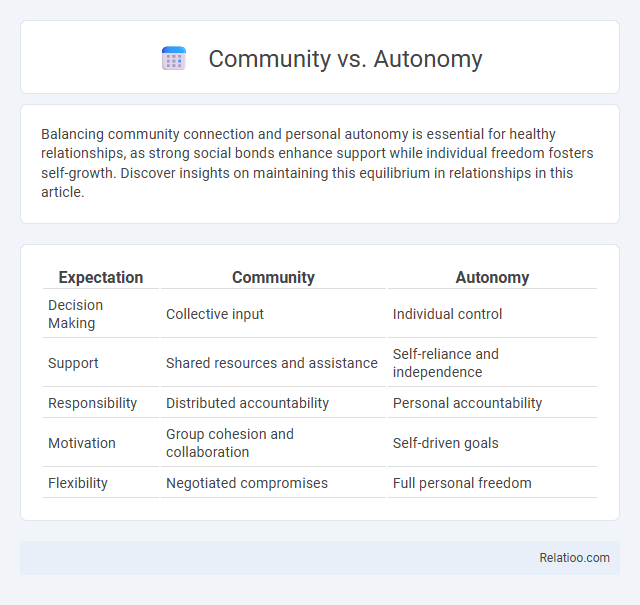Balancing community connection and personal autonomy is essential for healthy relationships, as strong social bonds enhance support while individual freedom fosters self-growth. Discover insights on maintaining this equilibrium in relationships in this article.
Table of Comparison
| Expectation | Community | Autonomy |
|---|---|---|
| Decision Making | Collective input | Individual control |
| Support | Shared resources and assistance | Self-reliance and independence |
| Responsibility | Distributed accountability | Personal accountability |
| Motivation | Group cohesion and collaboration | Self-driven goals |
| Flexibility | Negotiated compromises | Full personal freedom |
Defining Community: The Power of Collective Identity
Community represents the power of collective identity, where individuals unite around shared values, goals, and experiences, fostering a strong sense of belonging and mutual support. Your connection to a community enhances social cohesion and psychological well-being by reinforcing common purpose and cultural continuity. This collective identity drives cooperation, trust, and solidarity, making communities essential for personal and societal resilience.
Understanding Autonomy: Embracing Individual Freedom
Understanding autonomy involves recognizing the fundamental human need for individual freedom and self-determination. Autonomy empowers people to make personal choices, fostering intrinsic motivation and psychological well-being. Embracing autonomy supports creativity, accountability, and a sense of ownership in both personal and professional contexts.
Historical Perspectives on Community and Autonomy
Historical perspectives on community and autonomy reveal a dynamic tension between collective identity and individual freedom that has shaped social structures across civilizations. Early communal societies prioritized collective well-being and shared responsibilities, while the Enlightenment era introduced a strong emphasis on personal autonomy, advocating for individual rights and self-governance. Understanding how these forces have interacted over time can help you navigate the balance between belonging to a community and asserting your independence.
Benefits of Strong Communities
Strong communities provide invaluable support networks that enhance mental wellbeing and foster a sense of belonging essential for personal growth. Your connections within a community create opportunities for collaboration, shared resources, and collective problem-solving, which drive social resilience and innovation. Emphasizing community ties can improve overall life satisfaction by fulfilling fundamental human needs for affiliation and mutual trust.
The Value of Personal Autonomy
Personal autonomy is essential for fostering individual empowerment and self-determination within social contexts. It enables people to make independent decisions that align with their values and preferences, enhancing psychological well-being and motivation. Balancing autonomy with community and affiliation needs strengthens social cohesion while respecting personal freedom.
Conflicts Between Collective Needs and Individual Desires
Conflicts between collective needs and individual desires often arise when community goals clash with personal autonomy or affiliation preferences. Your challenge lies in balancing the group's expectations against your unique aspirations and social connections, which can create tension and require careful negotiation. Effectively managing these conflicts ensures both personal fulfillment and community cohesion.
Balancing Community Cohesion with Independence
Balancing community cohesion with independence involves recognizing the importance of social bonds while preserving individual autonomy, ensuring members feel connected yet free to express personal agency. Emphasizing mutual respect and clear boundaries supports a healthy affiliation that fosters trust and collaboration without compromising self-determination. Effective communities cultivate environments where individuals contribute meaningfully while maintaining their unique identities and decision-making authority.
Community in the Digital Age: Connection or Isolation?
Community in the digital age shapes how social bonds form through online platforms, enabling You to connect globally while also facing risks of isolation due to superficial interactions. Digital communities offer diverse opportunities for shared interests and support networks, yet they sometimes lack the depth of face-to-face connections essential for emotional fulfillment. Understanding the balance between virtual engagement and authentic relationships is crucial for leveraging digital spaces to foster meaningful community ties rather than loneliness.
Cultural Influences on Community and Autonomy
Cultural influences significantly shape the balance between community and autonomy by determining the value placed on collective harmony versus individual independence. In collectivist societies, such as many Asian and African cultures, community ties and social cohesion are prioritized, fostering strong group affiliation and shared responsibilities. Conversely, individualistic cultures, prevalent in Western countries, emphasize personal autonomy, encouraging self-expression and independent decision-making over communal expectations.
Building Synergy: Harmonizing Community and Individual Autonomy
Balancing community and individual autonomy fosters synergy by aligning personal freedoms with collective goals, enhancing collaboration and innovation. Emphasizing shared values and open communication cultivates a supportive environment where affiliation strengthens autonomy without compromising group cohesion. This harmonious integration drives sustained motivation and productivity by respecting individual uniqueness within a unified community framework.

Infographic: Community vs Autonomy
 relatioo.com
relatioo.com